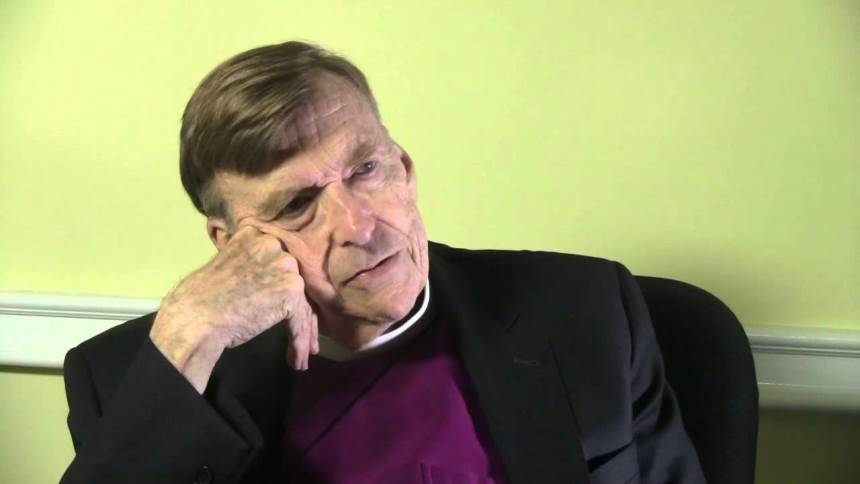The Great Divorce: Chapter 5


Summary
Two lions arrive, “playing some solemn romp”. Feeling nervous, Jack leaves. By the river, he finds one of the Bright People, a man named Dick, talking to the Episcopal Ghost Lewis had met earlier.
Dick and the Episcopal Ghost were friends on earth. The ghost reminisces about the conversations they used to have. He comments that his friend “became rather narrow-minded towards the end”, believing in a literal Heaven and Hell, but he assumes that he’s now “broadened out again”. In response to this, Dick asks the ghost if he knows where he thinks he’s been living. The ghost is scandalized when Dick refers to the Grey Town as “Hell” (but if he chooses to never go back, he may call it “Purgatory”). The Episcopal Ghost asks why he was sent to the Town and is told that it was because he was an apostate.
The ghost indignantly asks “Do you really think people are penalised for their honest opinions? Even assuming, for the sake of argument, that those opinions were mistaken.” He declares that “They were not only honest [opinions] but heroic. I asserted them fearlessly. When the doctrine of the Resurrection ceased to commend itself to the critical faculties which God had given me, I openly rejected it. I preached my famous sermon. I defied the whole chapter. I took every risk.” Dick points out that nothing was risked and the inevitable happened: “popularity, sales for your books, invitations, and finally a bishopric”.
Len explains their “opinions were not honestly come by”. They adopted a certain current of ideas because they “seemed modern and successful”. He asks his ghostly friend “When, in our whole lives, did we honestly face, in solitude, the one question on which all turned: whether after all the Supernatural might not in fact occur? When did we put up one moment’s real resistance to the loss of our faith?” He says that they were “playing with loaded dice… errors which are sincere in that sense are not innocent.”
The Bright One tells him “You have seen Hell: you are in sight of Heaven. Will you, even now, repent and believe?” The ghost affirms that he already believes, saying his “religion is a very real and a very precious thing”.
Dick invites him to the mountains, but the ghost says he will only do so with some assurances: “a place where I shall find a wider sphere of usefulness-and scope for the talents that God has given me – and an atmosphere of free inquiry”. Dick promises him no such thing, “No sphere of usefulness: you are not needed there at all. No scope for your talents: only forgiveness for having perverted them. No atmosphere of inquiry, for I will bring you to the land not of questions but of answers, and you shall see the face of God.”
The ghost protests that “there is something stifling about the idea of finality… what is more soul-destroying than stagnation?” The Spirit responds “There was a time when you asked questions because you wanted answers, and were glad when you had found them… Thirst was made for water; inquiry for truth. What you now call the free play of inquiry has neither more nor less to do with the ends for which intelligence was given you than masturbation has to do with marriage.” Regarding this statement as obscene, the ghost responds saying “that question-and-answer conception of thought only applies to matters of fact. Religious and speculative questions are surely on a different level.”
Dick asks the ghost if he even believes that God exists, to which the ghost asks “What does Existence mean?”
Dick then asks if he still even desires happiness, but while the ghost is dispensing his own wisdom on the subject, he suddenly remembers that he’s later presenting a paper at the Grey Town’s Theological Society, asking what Jesus’ opinions would have been if he hadn’t been tragically killed at such a young age. It is at this point the Spirit leaves him and the ghost returns to the bus humming a hymn to himself.
Lewis tries walking on the river’s hard water and falls flat on his face due to the water’s motion.
Questions
Q1. What do you think is the significance of the lions?
Q2. What do we learn about the background of the ghost and the spirit in this chapter?
Q3. Why is the ghost’s criticism of the spirit’s “narrow” opinions ironic?
Q4. What is the ghost’s sin?
Q5. How do the ghost and the spirit each regard the ghost’s beliefs?
Q6. What are the ghost’s demands for Heaven?
Q7. What would you regard as the ghost’s essential resistance to the spirit and to Heaven?
Q8. Why do you think the chapter ends in the way it does?